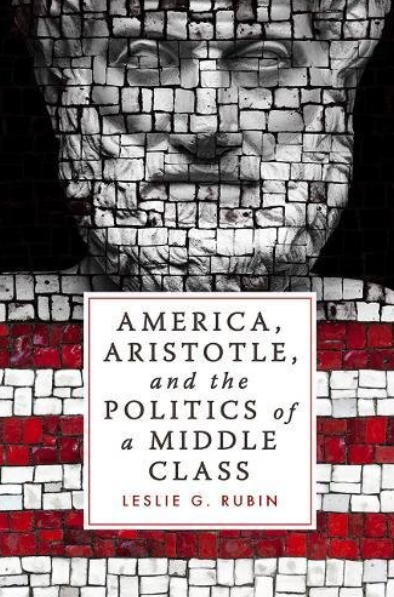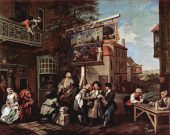Our “Great American Middle” and Aristotle’s Golden Mean
Students of the American regime often trace its Founding principles to John Locke, and understand it as a modern regime, in contrast to an ancient one. Modern regimes aim at protecting rights, especially freedom, whereas ancient regimes aim at fostering virtue. From such a perspective, we can either be satisfied with mediocrity and the material comforts it provides, or be dissatisfied with these and thus disdain American politics in light of the noble or beautiful possibilities of imaginary republics that are no longer feasible, if they ever were. These are bleak alternatives: either accept the low aims of our polity, or withdraw from it.
The achievement of Leslie G. Rubin’s book, America, Aristotle, and the Politics of a Middle Class, is to offer us a new way to understand the American polity: as one in which we can take pride. Her book is a defense of politics, and of American politics in particular. And, if this were not enough, her book defends Aristotle to Americans, by showing that his political theory has much in common with the understanding and goals of our Founders.
The Solid Can Be Worthy and Good
Rubin does not argue that the Founders were looking to aristocratic virtue in spite of their language of rights and liberties, but rather that Aristotle advocated regimes based on the virtues of the middle class. Aristotle was more of a realist than some interpreters give him credit for. But in her analysis, that does not mean that he settles for “the low but solid,” but rather that he asks us to aim at the best political system humanly attainable. He shows that the solid can be worthy and good. Ultimately, Rubin asks us to rethink the differences between the ancient and the modern thinkers.
The first half of her book is an analysis of Aristotle’s Politics. The chapter entitled, “A Practical Republic: Aristotle’s Real-World Politics” is subtle, clear, and persuasive. It highlights much in Aristotle that resonates with American principles: a political order that recognizes the equality and liberty of its members; and a political order in which rule is shared, where there is rotation of offices according to established law. His real-world politics also recognizes numbers (for example, majority rule) and property as legitimate political principles, and the need for selectivity through elections in such a way as to promote virtue and talent.
Moreover, Aristotle’s practical republic finds both stability and virtue by giving prominence to the middle class. “Aristotle’s Middle-Class Republic: The Best Regime” is the culmination of Rubin’s analysis of Aristotle’s political thought. A large middle class can provide stability by arbitrating between rich and poor, while its members are willing and able to share in rule, for they possess neither the arrogance of the rich nor the envy of the poor. They rule and are ruled as free human beings, inclined to neither despotism nor servility. Their middling condition inclines them both to protect property and wealth (for they have some of their own to protect) and to keep open opportunities for advancement, for themselves as well as for the poor. Aristotle’s political thought does not point to an ideal that eliminates conflict; it aims for practical regimes that are most likely to moderate it and achieve justice.
While Rubin shows that Aristotle is more realistic about politics than we typically suppose, she finds that the American Founders were concerned not only with institutions, but with virtue and education. Moreover, the American Founders (a term she uses to refer to not only to those who attended the Constitutional Convention in 1787, but to “the Founding generation from the 1770s to the 1790s”) understood the American republic as a middle-class one, supported by and nurturing the virtues that Aristotle associated with the middle class. Hence there is “a historical parallel” between Aristotle’s project and that of our Founding generation.
This argument does not require that the Founders be self-aware Aristotelians, although Rubin does provide compelling evidence of the philosopher’s direct influence on one of them, John Adams. Adams’ monumental A Defence of the Constitutions of Government of the United States (1787-1788) is in large part an analysis of Aristotle’s Politics. Adams zeroed in on Aristotle’s teachings on the middle-class republic and on the character of the good citizen. With this important exception, the connection between Aristotle and the Founders that Rubin draws turns not on direct influence, but on these men’s awareness of fundamental principles of politics, as true in the time of Aristotle, in their time, and in our own.
The advantage of a politics of the middle class is not only a more just distribution of wealth. Rubin quotes Charles Pinckney of South Carolina claiming that “the mediocrity of fortune” in America is “a leading feature of our national character.” Our Founders thought that a political system in which honors and offices are open to all, and a broad franchise elevates merit and talent, would be conducive to self-reliance, industriousness, moderation and self-restraint, frugality, reasonable compromise and cooperation, public spiritedness, and friendship that cuts across economic classes.
Were the Founders Right about Education?
As Rubin documents from the writings of Madison, Jefferson, John Dickinson, Noah Webster, and many others, these prominent early Americans recognized the need for the citizens of the political community to care about one another’s virtue. Only then (for them as well as for Aristotle) is a free government possible, where citizens share in ruling, steering clear of both the despotic rule of some over others and the anarchy of polarized faction. Although some of these political writers took for granted the continued dominance of the middle class in American life, and the political virtues that were its concomitant, most understood the need for institutions and policies that would protect it, and especially for a moral education that supports middle-class virtues, as necessary to secure America’s future.
Rubin does not shy away from the questions of whether these men did enough to secure that future, and of whether the middle class in America, and American public life in general, have suffered a decline. They paid considerable attention to education, as Rubin shows, but did they leave it—some for good and principled reasons—in private hands or to very local control? And was that sufficient? Did the Founders make clear enough the connection between republican self-governance and moral and civic education, to say nothing of the “liberal and learned education” that Benjamin Rush advocated for self-governing citizens?
The debates and ratification struggles around the Constitution focused on how best to fashion the institutional arrangements of the new government. Less articulated, she notes, were questions of the way of life or moral character of the people required for the success of the American experiment. Moreover, there have been and are political theories afoot that devalue the virtues of the middle class, from Henry David Thoreau’s “republic of one,” to various socialisms, to progressivism, from John Stuart Mill to Herbert Croly. These have taken their toll, so that, as she says, “Barely a single one of the Aristotelian middling virtues or the founding’s republican manners is openly revered today.”
No wonder that today’s middle class, characterized by political apathy rather than public spiritedness, and showing a predilection to spend rather than save, and pursuing only “endless upward economic mobility,” no longer serves the political function the Founders thought it would. And no wonder that public officials today praise education “almost exclusively” for “its personal economic value—the improvement in earning potential.” Thus Rubin articulates “the challenge of the twenty-first century,” which is the “rebalancing of political order around the middle class” to prevent the triumph either of amoral elites or of “the poorly-educated who cluster around a demagogic leader.” It is a sobering reflection on our current politics when she observes that “America seems to suffer both pathologies at the moment.”
Aristotle and Adams
Notwithstanding her reliance on Aristotle’s account of the middle class and its virtues, Rubin acknowledges that they do not have Aristotle’s full support. She warns us that for the Greek thinker, the middle-class republic is not the best regime simply; that while Aristotle sees in the members of this class some ethical virtues, they are “not the noblest ethical virtues”; and that for him, “the middling sort make good citizens” but “not completely good human beings.”
Do such reservations, we must wonder, undermine Rubin’s project by pointing us away from even the best in our Founders’ regime?
That astute Aristotelian scholar John Adams did not share the reservations about the middle class that Rubin attributes to Aristotle. Adams “reviles” Aristotle’s argument for “exclusive aristocracy” in his simply best regime while “passionately embracing Aristotle’s praise of the middle class.” America’s second President was able to hold unequivocally that the middle-class republic was best, and that “the middle life is happiest.”
Was Adams guilty—as so many scholars have been for ages—of picking and choosing from Aristotle’s text what most fit his own predilections? Or did Adams, when confronted with two conflicting recommendations from Aristotle—the middle class and an exclusive aristocracy—choose the one that seemed to have greater weight, and that gave more credit in his view to the philosopher? While Rubin does not carry her argument in this direction, she does provide the evidence of the tension in Aristotle’s text, Adams’ keen awareness of it, and Adams’ intellectually probing and morally sound reaction. And nowhere in her book does she gainsay John Adams.
In the thoughtfulness and the statesmanship of Adams and the other Founders, if not in our contemporary middle class, Rubin found reason for hope. She gives us reason, too. She challenges us to regain our “republican faith” that “a life lived in the middle guided by good habits fortified by modest resources is the best attainable human life.”
Tribute to the Author
To conclude this review, I would like to add on a personal note that Leslie Rubin, who died last year, was a friend and colleague of mine for many years. Her family and friends grieve that she is not here to discuss this book with us. But we are grateful that she wrote it. What it shows—and what could be seen from her teaching and mentoring of students and fledgling scholars at Duquesne University and beyond—is her deft way of maintaining a middle ground between equality and excellence, and therewith her justice.



